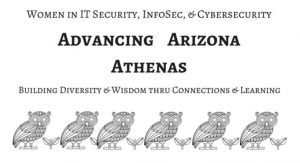We may hit 3.5 million unfilled cyber security jobs by 2021. That’s a lot of SOC analysts, network engineers, systems administrators, IT auditors and penetration testers. Education, business, government and community partners all recognize the cyber skills gap, but it’s still tough to get a job—or at least the job that you want.
We asked University of Advancing Technology Cyber Security Program Champion Greg Miles to share his top tips for launching a successful career in cyber security. We also invited McKesson’s Head of Cyber Security Active Defense Lonnie Benavides to campus to share his industry insights with UAT students.
Here are their top five tips:
- Get better at talking to humans.
You’ll need to talk to several of them to get a job. You might also have to tell a boardroom full of fancy executives that you need to shut down their website, which makes them millions of dollars every day. To have any shot at a successful cyber career, you need to communicate in a clear, calm way when combating cyber attacks.
To practice, Benavides recommends explaining cyber security to your grandparents. “If you can do that, then you can explain it to a CEO,” he said.
Get connected with your local cyber security community. Even though Phoenix is the 5th biggest city in the country, our cyber community is super connected. Check out David Hernandez’s South West Cyber Events calendar. Hang out at the Arizona Cyber Warfare Range. Join Rachel Harpley's group Advancing AZ Athenas.

Shoot for attending four or five events and grabbing coffee with four or five professionals every semester. When you make it an event, go up to a group of people and introduce yourself. For example: “Hi, I’m [Your Name]. Why did you come to the event tonight?” And always remember to follow up!
Professor Miles hears two constant requests from hiring managers, CEOs and cyber security experts: 1) Help them communicate better 2) Teach them to write better.
- Get better at writing.
Hackers and analysts write reports. Everybody writes emails. Plus, poor grammar undermines your credibility.
- Specialize.
Specializing can help you stand out in a job market full of entry-level positions that require several years of experience. Benavides chose web applications. A lot of companies are starting to ask for cloud security experts (even though it’s pretty much the same thing). Candidates with strong programming, AI and big data chops will definitely stand out. Students can also dive deeper into incident response, pen testing or architecture.

Outside of traditional complementary skill sets, students could gain a lot by studying design thinking and psychology. Capitalize on the blockchain craze. “Blockchain technology could offer genuine privacy protection and a platform for truth and trust in a trustless world,” Miles said. Anyone speak Mandarin or Russian?

Certifications help too. "Start with the basics, and then as you get experience, you qualify for the more complex ones," Miles advised.
- Automate.
During his presentation, Benavides challenged students to “Be worth two peers.” He also encouraged them to “use data to solve problems.” Automation saves time and money, and companies like saving time and money. “And when you use software to automate, you have more time for video games,” Benavides added.
- Get real-world experience.
“Having a degree is awesome, but in addition to that, employers want students to have experience,” Professor Miles said. Specifically, Miles says that companies look for entry-level candidates who complete at least two or three internships.
One possible route to consider: Complete a general IT internship your sophomore year, move into a SOC analyst internship your junior year and then complete an incident response internship your senior year (and hopefully turn it into a full-time job offer).
"In summary, you need to have a combination of abilities and credentials, and you must be a well-rounded individual to have a successful cyber career," Miles said.
To learn more about UAT's cyber security program, visit our website.





Comment